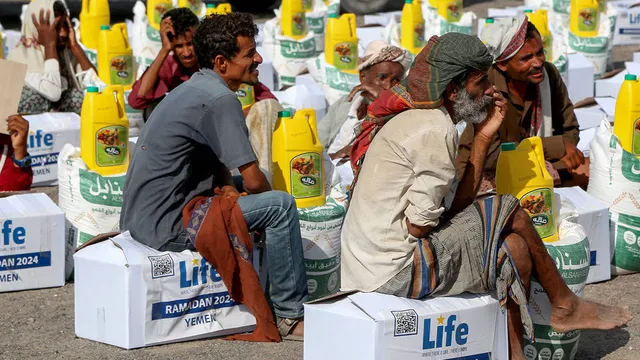
Pope Leo XIV meets with US leaders to discuss religious freedom
2025-05-21 15:39- On May 19, 2025, Pope Leo XIV met with U.S. Vice President JD Vance and Secretary of State Marco Rubio at the Vatican.
- The discussions centered on bilateral relations, religious freedom, and collaboration between the church and state.
- The meeting reflects the Vatican's ongoing engagement with U.S. officials in addressing social and international issues.
Express your sentiment!
Insights
On Monday, May 19, 2025, Pope Leo XIV, the first American pope, held a private audience with U.S. Vice President JD Vance and Secretary of State Marco Rubio at the Vatican. The meeting lasted for 45 minutes and was described by the Holy See Press Office as cordial. Both Vance and Rubio were accompanied by their spouses. This meeting followed the inaugural mass for Pope Leo XIV, which took place just a day earlier, and was attended by several dignitaries. The talks focused on bilateral relations between the United States and the Vatican, laying emphasis on the importance of religious freedom and collaboration between the church and state. During the discussions, the officials acknowledged the strong relationship between the U.S. government and the Holy See, expressing satisfaction with their ongoing cooperation. Key topics included religious freedom issues and the need for collaboration on matters of ecclesial life in the United States. Additionally, they shared perspectives on various international issues, advocating for adherence to humanitarian and international laws, particularly in regions experiencing conflict. There were calls for negotiated solutions among the conflicting parties to ensure stability and peace. Pope Leo XIV’s presidency marks a significant moment in history, as it is not only notable for being the first American pope but also reflects the evolving dynamics of the Catholic Church under his leadership. The recent criticism of U.S. migration policies by accounts purporting to be associated with Leo suggests potential complexities in the church's political engagement. It remains to be seen how his papacy will navigate these challenges while fostering dialogue with global leaders. The meeting between the pope and U.S. leaders highlights the Vatican's interest in strengthening relations with the American administration. The presence of JD Vance, a practicing Catholic, alongside Marco Rubio at this high-profile meeting underscores an influential interplay of faith and politics amidst contemporary global issues. Overall, this encounter signals the pope’s commitment to unity and his desire to influence secular matters through moral and ethical discussions rooted in Catholic doctrine.
Contexts
The Vatican's relationship with the U.S. government is a complex and evolving interaction that encompasses diplomatic, cultural, and religious dimensions. Historically, this relationship has been characterized by a mutual interest in addressing global issues, such as peace, human rights, and social justice. The Vatican, as the center of the Roman Catholic Church, seeks to promote its moral teachings on these matters, while the U.S. government values the Vatican's influence in international diplomacy, particularly in regions where the Church plays a significant role in community and civil society. The establishment of formal diplomatic relations in 1984 marked a significant milestone, enhancing political dialogue and cooperation between the two entities. Over the years, popes have engaged with various U.S. administrations, capitalizing on shared values and goals, as well as advocating for the voiceless and marginalized in society. The Vatican's neutrality is often seen as an asset in its diplomatic endeavors and its ability to address contentious moral issues from a unique standpoint distinct from typical geopolitical interests. This allows for a productive engagement with U.S. policymakers, who frequently consult the papacy on matters related to international peace and security, among other global concerns. More recently, issues such as immigration, climate change, and poverty have become focal points in the U.S.-Vatican dialogue. The Vatican has been vocal in its advocacy for humane immigration policies and addressing the plight of refugees, often aligning with movements within the U.S. that promote social justice and humanitarian assistance. Moreover, the Vatican's strong emphasis on environmental stewardship, highlighted by Pope Francis's encyclical 'Laudato Si,' resonates with the growing U.S. discourse on climate change. The Church's moral authority on these issues has led to collaborative efforts with U.S. government agencies as they seek to address the challenges presented by these pressing global crises. The Vatican leverages its international network and metaphysical authority to call for concerted action on these issues, which aligns with several administration policies focused on similar goals. Another noteworthy aspect of the Vatican-U.S. relations is the impact of domestic policies on the interaction. The role of the Catholic faith in U.S. society, particularly during election cycles, can influence both the Vatican's outreach and U.S. government responsiveness to Church teachings. U.S. administrations may find it politically advantageous to strengthen ties with the Vatican, especially during times of social unrest or when seeking to rally support for particular values. Conversely, specific U.S. policies—especially those that contradict Catholic social teaching, like certain reproductive rights legislation—can create friction between the two entities. Nonetheless, both the Vatican and the U.S. government often seek common ground amid these tensions, ultimately striving to maintain a productive relationship focused on broader humanitarian objectives. In conclusion, the Vatican's relations with the U.S. government reflect both historical ties and contemporary challenges that require ongoing dialogue and collaboration. These relations are shaped by a shared commitment to addressing global issues, despite occasional domestic policy conflicts. As both entities navigate their respective roles on the global stage, their partnership remains vital in promoting peace, social justice, and moral leadership in an increasingly complex world. In the coming years, the extent and nature of their engagement will likely continue to evolve, adapting to new challenges while remaining rooted in their foundational mission of service to humanity and the promotion of the common good.